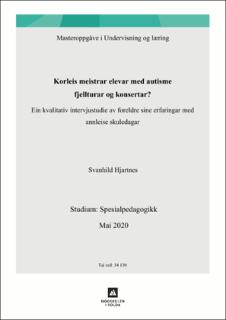Korleis meistrar elevar med autisme fjellturar og konsertar? Ein kvalitativ intervjustudie av foreldre sine erfaringar med annleise skuledagar
Master thesis
Published version
Permanent lenke
https://hdl.handle.net/11250/2680003Utgivelsesdato
2020Metadata
Vis full innførselSamlinger
Sammendrag
Denne studien handlar om korleis elevar med autisme meistrar annleise skuledagar. Ekskursjonar, skidagar og juleavslutningar er døme på skuledagar utan vanleg timeplan. Slike dagar bryt med ordinære rutinar og stiller høge krav til sosial kommunikasjon. Begge deler kan vera utfordrande for menneske med autisme.
Dei fleste foreldre kjenner barna sine godt, og foreldre til elevar med autisme fungerer ofte som ein avgjerande støtte gjennom heile skulegangen og langt inn i vaksenlivet. Derfor er det deira stemme som har kome til orde i denne studien, og problemstillinga lyder slik: Korleis erfarer foreldre at elevar med autisme meistrar annleise skuledagar? Det finst mykje forsking på tilrettelegging i klasserommet, men det er lite å finna om dei aktivitetane som skjer elles i skulelivet. Formålet med studien er å auka merksemda rundt utfordringane på annleise skuledagar, og at auka merksemd kan føra til forståing for tilretteleggingsbehov. Studien er avgrensa til høgtfungerande elevar med autisme på ungdomstrinnet. Undersøkinga av problemstillinga vart gjort gjennom kvalitative, semistrukturerte intervju. Informantane er fem foreldre frå fem forskjellige kommunar i Sør-Noreg. Studien tek utgangspunkt i ei fenomenologisk og hermeneutisk tilnærming. I analysen av datamaterialet blir det nytta både deduktiv og induktiv framgangsmåte.
Det sentrale funnet er at annleise skuledagar er ei stor påkjenning for elevar med autisme, og at foreldra ynskjer betre tilrettelegging slik at barna kan meistra fleire slike dagar. Studien viser at det i større grad går an å meistra dagane dersom elevane er godt førebudde og kjenner seg trygge. Dersom skulen greier å redusera påkjenningane, er sjansen større for at elevane meistrar. Grundig tilrettelegging med vekt på stabile rammer og positive opplevingar, planlagt saman med elevane og foreldra, kan bidra til utvikling av både faglege og sosiale ferdigheiter, og såleis auka motivasjonen til å bli med fleire gongar. Dilemmaet knytt til elevar med autisme sitt behov for deltaking i det sosiale samspelet blir drøfta opp mot behovet for å utvikla seg og læra på sine eigne måtar.
Eit anna viktig funn er at foreldra saknar kunnskap om autisme i skulen. Med utgangspunkt i dette, blir det drøfta korleis heim og skule kan samarbeida for å auka kunnskapen. Vidare handlar drøftinga om kompleksiteten i skulen som institusjon, der læraren på den eine sida skal ta omsyn til alle elevane, og på den andre sida den kapasiteten som ligg i kollegiet for å gjera kunnskapsbaserte endringar som fører til relevant tilrettelegging for elevar med autisme Summary
This master thesis examines how students with autism cope with alternative school days. School outings, ski trips and holiday recitals are examples of alternative school days without a regular schedule. Such days break with ordinary routines and place high demands on social communication. Both can be challenging for people with autism.
Most parents know their children well, and parents of students with autism often act as a crucial support throughout schooling and well into adulthood. Therefore the focus of this thesis is on their experiences, and the main question reads as follows: How do parents experience that students with autism cope with alternative school days?
There is a lot of research on facilitation in the classroom, but there is little to be found on the activities that happen elsewhere in school life. The purpose of this study is to raise awareness of the challenges of alternative school days, and that increased awareness can lead to an understanding of the need for facilitation. The study is limited to high-functioning students with autism in adolescence. The research questions were explored through qualitative, semistructured interviews. The informants are five parents from five different municipalities in Southern Norway. The study is based on a phenomenological and hermeneutic approach. In the analysis of the data material, both deductive and inductive methods are used.
The main finding is that alternative school days lead to great stress for students with autism, and that parents want better facilitation so that children can cope with more such days. The study finds that it is easier to cope if the students are well prepared and feel safe. If the school manages to reduce the stress, the chances are that the students will be able to cope better.Thorough facilitation with emphasis on a stable framework and positive experiences, planned with the students and parents, can contribute to the development of both professional and social skills, and thus increase the motivation to participate more. The master thesis discusses the dilemma associated with students with autism and their need for participation in social interaction against the need to develop and learn in their own ways.
The master thesis also shows that parents experience a lack of knowledge concerning autism in school. Based on this, it is discussed how home and school can work together to increase knowledge. Furthermore, the discussion deals with the complexity of the school as an institution, where the teacher, on the one hand, must take into account all the students, and on the other, the capacity of the staff as a whole to make knowledge-based changes that lead to relevant facilitation for students with autism.
